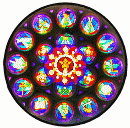MACAULAY, Robert: 1744 - 1800
Tile ordered and paid for by Charlotte Macaulay,* Berlin, Germany, December 1888
Captain Robert Macaulay, who was born in Omagh, Ireland, emigrated in 1764, at the age of twenty, with his two brothers to New York. Robert started a farm and a lumber business south of Plattsburgh and by 1770 he had acquired a sizable estate on Lake Champlain. At the beginning of the Revolutionary War, his farm and lumber business were confiscated because of his Loyalist sentiments. Twice imprisoned by the revolutionary forces, he escaped and came to Upper Canada and by 1780 he was established as a merchant at Carleton Island near Kingston, Ontario. He became Captain of the Associated Loyalists on Carleton Island, then when the garrison moved to Kingston, he followed and became established there as a merchant.
Robert Macaulay and a partner, Thomas Markland, acted as collecting agents for subscriptions to fund the construction of the first St. George’s Church (Church of England) in Kingston, and were themselves benefactors of the church. In 1796, John Kirby, Robert’s wife’s brother, became his partner and then, after Robert’s death, John Kirby and Robert’s widow, Ann, carried on the business. In 1797, Robert had been granted 1200 acres of land and his will mentions assets which include six town lots, two dwellings, a blacksmith shop and hundreds of acres of farm lots.
Robert had married Ann Kirby (1770 - 1850) on February 13, 1791 at Crown Point when he returned briefly to New York State to try and recover some of his confiscated property.
Robert and Ann had three children: John, William and Robert. John Macaulay (1792 – 1857), one-time owner of the Kingston Gazette, was appointed to the Legislative Council for the Province and was a Surveyor General and Customs Arbitrator.(1) Robert junior (1796 – 1823) practiced law in Montreal until his death at the age of twenty-six.
William Macaulay (1794 - 1874), who was just six years old when his father died in 1800, inherited 500 acres of land near the settlement of Hallowell Bay and his inheritance played a significant role in the development of Prince Edward County. William was educated in Cornwall under the Reverend John Strachan. He studied theology at Oxford and was ordained as a priest in 1819. Soon thereafter, he settled on his land in Hallowell as a missionary. In 1816, William gave the village established on his land the name Picton, to honour General Sir Thomas Picton. A church was begun there in 1825, financed by Macaulay and built on his land. In 1827 he was appointed the first resident Rector. The building was consecrated as St. Mary Magdalene Church in 1830 and now serves as the Picton Museum. A school was also built on a portion of his land.(2)
Robert Macaulay, a courageous and energetic early settler in Upper Canada, died in Kingston on September 1, 1800, age fifty-six years.(3)
* Charlotte Jane Macaulay was the daughter of John and granddaughter of Robert Macaulay.
1. “John Macaulay,” www.wikepedia.org, accessed May 2011.
2. “William Macaulay,” Dictionary of Canadian Biography Online, Vol. X.
3. “Macaulay, Robert,” Dictionary of Canadian Biography Online, Vol. IV.

